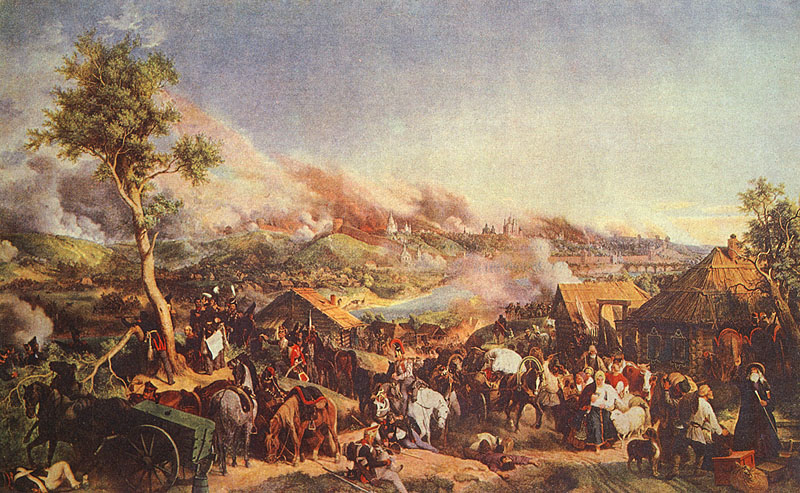|
|

|
|
Napoleon advancing to Smolensk was aiming to one goal - to make Russian army to give a general battle. Moreover knowing that both our armies on the 25th of July (the 7th of August) left to Rudnya and in Smolensk for it defence just one corps of Raevskiy was left Napoleon decided in spite of all to seize Smolensk earlier then our armies could come back and to throw them off the Moscow road. He did not succeed to fulfill it. Neverovskiy that was on his way had time to come back to Smolensk and to increase garrison. Napoleon came to Smolensk in the morning of August 3rd (15th ) when our armies were just in the way. And though he had undertook the attack, the Raevskiy's corps and the division of Neverovskiy showed such a resistance during all the day that all the efforts of Ney and Davout troops that were engaged in the battle to seize Smolensk were futile. And by that time both our armies returned. At first in the evening of August 4th (16th ) the 2nd army of Prince Bagration came back and at night the 1st army of Barclay de Tolly. It was expected that Barclay would give the decisive battle. But he was loyal to his tactics - to decoy the enemy as deep as possible inside the country - and had undertaken the following: early in the morning of August 5th (17th ) he had transferred the 2nd army of Bagration to the Moscow road while he himself was staying at the right bank of Dnepr river. 20.000 under command of Dokhturov were detached for defence of Smolensk. At 8 in the morning Napoleon started the bombardment of Smolensk from 150 cannons. At 4 p.m. he ordered to begin the storm having in his disposal 150.000 against Dokhturov's 20.000. As if a hellish hurricane blew over the ancient city. 150 iron jaws were continuously belching fire and smoke sending the endless number of balls and grenades and all this lethal cloud was raining down at the city. Its solid high walls that were standing for hundreds years calmly sustained desperate cannonade but the shells were flying over to the town bringing the death and distructions. The balls stuck into the walls of buildings making the gaping breaches, grenades exploded into the pieces and their iron sparks were scattering far away in the air hurting soldiers and peaceful inhabitants. The fires were blazing up either in one or in an other end of the city. There was nobody to extinguish them. The fire was easily spreading over entire Smolensk. From its 2.250 buildings, shops and factories just 350 remained intact. The panic seized the innocent inhabitants: some were looking for salvation in the cellars of their houses, others were hurrying out of the city having load on the vehicles some baggage, their wives and children as far as possible from the cannonade and fire. All this hell and phantasmagoria of war could be understandable looking at reproduced canvas where at back ground the clouds of smoke and fire over the burning city go up to the sky. The confused mass of looking for salvation inhabitants is at the fore ground. At the left Barclay de Tolly could be seen. He seats and observes the course of events, Aleksey Petrovich Ermolov, one of the famous heroes of Patriotic War stands by him. Among the heroes that were defending Smolensk General-Lieutenant Count Petr Petrovich Konnovnutsin had especially distinguished. Konnovnitsin disdaining the death spent the whole day observing the actions of our troops appearing always in the most dangerous places and been wounded in the hand did not left the battle field till the very evening. In the evening the cannonade went down. Dokhturov had brilliantly fulfilled the entrusted tusk - to retain the French army to prevent the retreat of our main forces. When there was no more necessity to fight for the burning city Barclay ordered Dokhturov to evacuate it. That was fulfilled at night. The 1st army retreated to Moscow road. The French occupied Smolensk. But that occupation of the old Russian city was not happy. Ruined, devastated, burning it could not serve as a refuge even for the short rest and created an oppressive impression. It was told that on the 7th (199th ) of August Napoleon visited the city cathedral filled by wounded , elders, women and children that got mad after the horrors of bombardment and were praying, crying or obediently waiting for their death. Napoleon was shocked. Meanwhile the course of events was making him to advance further into the depth of the unknown country among infinitely hostile population though the idea to stay here for the winter was already expressed. Later Napoleon said "The new Spain was forthcoming us, but it was Spain without borders, towns and means". Moscow was pictured to French as the Promise Land where all the burdens of the severe campaign would finish themselves and following this phantom Napoleon left the burnt ruins of Smolensk and followed the retreating Russian army. Before that at first time he had sent to Emperor Alexander the peaceful proposal. Alexander replied on it with silence… The comments are edited by I.N.Bojeyarov. The album "Invasion of Napoleon. Patriotic war of 1812." St.Petersburg, 1911 Prepared for Publication by Poliakov O. Translated by Makarov M. © 1997-1998, Published as part of the project "1812". |